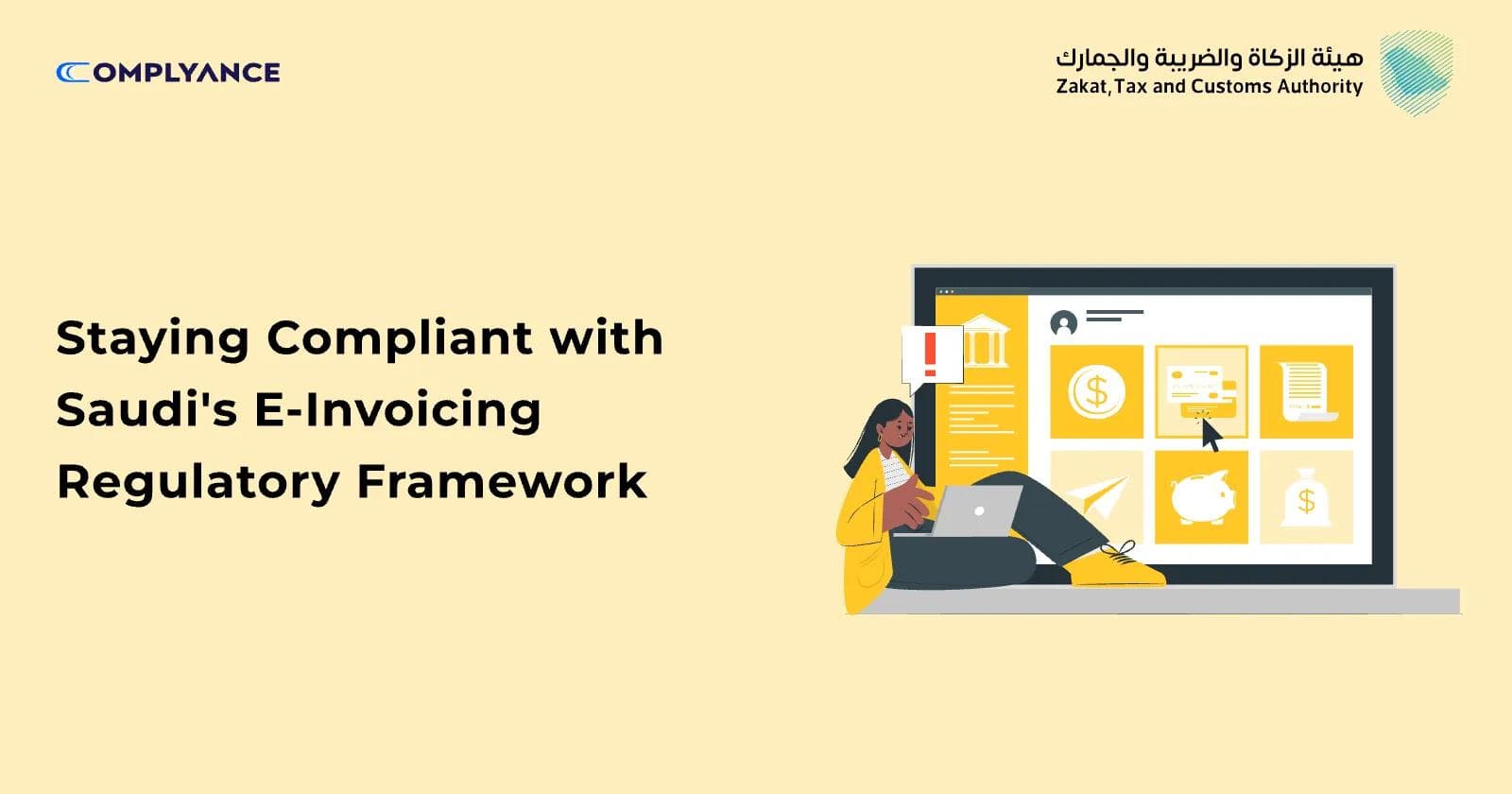Staying Compliant with Saudi's E-Invoicing Regulatory Framework
The Kingdom of Saudi Arabia has been making significant strides in digital transformation across various sectors

Table of Contents
Staying Compliant with Saudi's E-Invoicing Regulatory Framework
The Kingdom of Saudi Arabia has been making significant strides in digital transformation across various sectors. One of the pivotal moves in this journey is the introduction of the E-invoicing Regulatory Framework by the Zakat, Tax and Customs Authority (ZATCA). As businesses race to align with these new regulations, understanding the intricacies is vital. Here's a deep dive into the framework and steps to ensure compliance.
Introduction to the ZATCA E-Invoicing Framework
ZATCA introduced the E-invoicing Regulatory Framework as part of Saudi's Vision 2030 program to modernize the economy, ensure tax compliance, and reduce fraudulent activities. With the digitization of invoicing, businesses can benefit from streamlined operations, reduced paperwork, and enhanced transparency.
Why the Change?
First off, let's chat about why this is happening. Saudi Arabia has a big vision - it's called Vision 2030. Part of that dream is to make business transactions smoother, clearer, and, well, more modern. So, instead of stacks of paper invoices, ZATCA is saying, "Let's go digital!" It's all about being efficient and transparent.
What's the Big Deal?
Now, you might wonder what the fuss is all about. Here's the scoop:
- Uniform Look: Just like how all our favorite apps have a familiar layout, e-invoices will follow a certain format. It makes things easier to read and understand.
- Keeping It Real: To make sure every e-invoice is legit, there's going to be something like a digital "seal of approval". Think of it as a virtual handshake that says, "This is genuine!"
- Quick Updates: Some businesses might need to send their invoices to ZATCA pronto! It's like posting a photo online; the moment you click, it's out there.
- Safe Keeping: Just because it's digital doesn't mean it's temporary. These e-invoices need a cozy corner on the cloud or servers for a while, just in case anyone wants to revisit them.
How to Stay in the Clear?
Alright, so how do we make sure we're on the right side of these rules?
- Tech Talk: First things first, check if your software is up-to-date with ZATCA's rules. It's like ensuring your phone can run the latest apps.
- Team Time: Have a chat with your team. Maybe even organize a fun workshop (with snacks, of course!) to go over the e-invoicing process.
- Check and Double-Check: Every now and then, take a moment to review your e-invoices. It's always good to catch any little hiccups early.
- Stay Tuned: Rules can get tweaks and updates. It's like app updates – there's always a new version around the corner. So, keep an eye out for any announcements from ZATCA.
ZATCA's E-Invoicing: The Core Motive
So, why e-invoicing? Why now? Here's the essence of ZATCA's initiative:
- Boosting Transparency: One of the primary motives behind the e-invoicing move is to enhance transparency in financial transactions. With digitized invoices, there's a clear trail, reducing discrepancies and ambiguities.
- Enhancing Tax Compliance: With e-invoices, tax computations and submissions become more streamlined. This system aims to ensure businesses pay their fair share, fostering a just economic environment.
- Curbing Financial Frauds: Digital invoicing significantly reduces the chances of financial frauds. With each invoice authenticated and logged, the scope for manipulations diminishes.
- Efficiency & Modernization: Let's face it – the digital realm is faster and more efficient. By transitioning to e-invoicing, Saudi Arabia aims to accelerate business transactions, reduce bureaucratic delays, and promote a modern business environment.
- Environmental Concerns: Less often spoken about, but equally crucial – by reducing the reliance on paper, the Kingdom is also taking a step towards environmental conservation.
The Chain Reaction of Digital Invoicing
Beyond these core objectives, ZATCA's e-invoicing regulation is expected to have a cascading positive effect:
- Business Growth: With streamlined operations, businesses can focus on growth and expansion without getting bogged down by cumbersome paperwork.
- International Relations: As global business becomes increasingly digital, Saudi Arabia aligns itself with international standards, facilitating smoother cross-border transactions.
- Empowering SMEs: Small and Medium Enterprises (SMEs) stand to benefit significantly. With reduced operational complexities, they can compete on a level playing field with larger entities.
Conclusion
ZATCA's E-Invoicing Regulatory Framework isn't just a policy change; it's a reflection of Saudi Arabia's ambition to sculpt a transparent, efficient, and modern economic landscape. It's a testament to the Kingdom's commitment to its Vision 2030 and its dedication to fostering a robust business ecosystem.
Related posts
Subscribe to our Newsletter
Get the latest compliance updates, e-invoicing news, and expert tips delivered to your inbox.
ABOUT COMPLYANCE
Empowering businesses to automate e-invoicing and stay compliant in 100+ countries. Our platform simplifies regulatory complexity for enterprises and fast-growing companies.
Go Live in a Week with Developer-Friendly Global E-Invoicing Platform
Complyance makes it easy for your IT/dev team to integrate once and automate E-Invoicing across 100+ countries. Built for fast deployment, field-level validation, and indirect tax accuracy—no delays, no rework.



